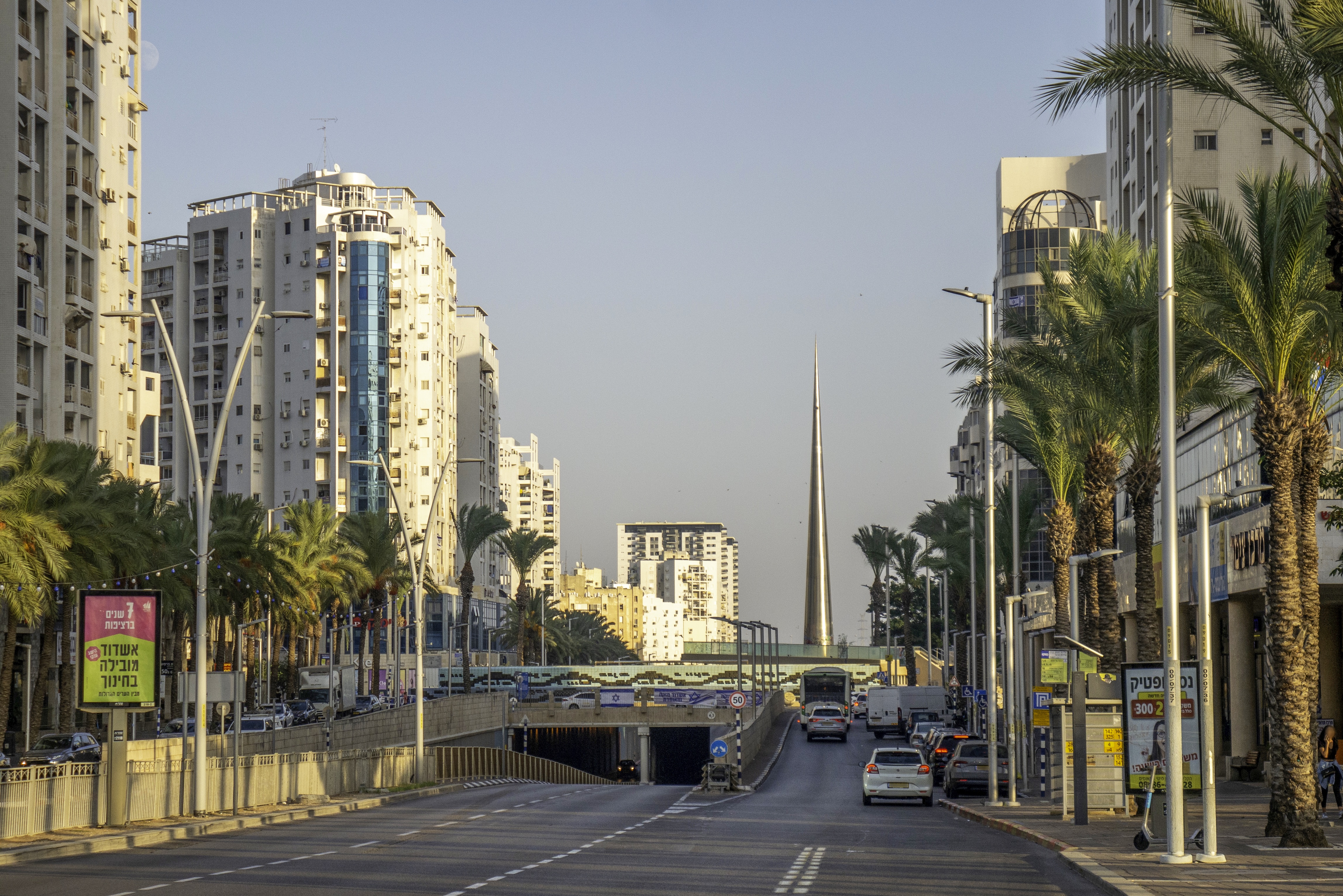|
Israeli Andalusian Orchestra
The Israeli Andalusian Orchestra () is a musical ensemble based in Ashdod, Israel. History Originating as a project to honor the heritage of immigrants from the Maghreb, the Israeli Andalusian Orchestra was formed in Ashdod in December 1987, as a joint initiative of the liturgical singer and classical conductor Moti Malka and then-mayor Arieh Azulay, both of Moroccan origin. The Orchestra is financed by the Ashdod municipality and the Culture Ministry and has toured Israel, the United States, and several European countries. The orchestra comprises around 30 musicians and singers, mainly of Tunisian, Moroccan and Russian origin. It features traditional Sephardic Jewish-Arab and Andalusian music and poetry, combining classical Arab-Andalusian and European instruments. The orchestra's artistic director and head conductor is Sivan Albo-Ben Hur. Awards and recognition In 2006, the orchestra was awarded the Israel Prize, for its lifetime achievement and special contribution to society ... [...More Info...] [...Related Items...] OR: [Wikipedia] [Google] [Baidu] |
Abatte Barihun
Abatte Barihun (; born 1967) is an Israeli jazz saxophonist and composer. His sound is reminiscent of John Coltrane's, who has highly influenced Barihun. Early life and career (1967–1999) Barihun was born in Addis Ababa, the capital city of Ethiopia to a Jewish family. His house resided next to the music school of Addis Ababa University, as well as a nearby military base. Young Barihun fell for the march sound of the saxophones and other wind instruments emerging from the neighbouring military brass band. He got a saxophone and joined the music school, where he was exposed to the albums of Charlie Parker and others.Barry Davis''Ras Jazz'' ''The Jerusalem Post'', 1 August 2002 By the age of 16, Barihun joined the Ethiopian military band, with which he toured through Ethiopia and the Eastern Bloc. Mengistu Haile Mariam once sent him to play at Kim Il-sung's birthday in North Korea. This period in his life came to an abrupt end six years later, when the band's bus was ambushed by ... [...More Info...] [...Related Items...] OR: [Wikipedia] [Google] [Baidu] |
Andalusian Classical Music
Andalusi classical music (; ), also called Andalusi music or Arab-Andalusian music, is a genre of music originally developed in al-Andalus by the Muslim population of the region and the Moors. It then spread and influenced many different styles across the Maghreb (Algeria, Libya, Mauritania, Morocco, Tunisia) after the Expulsion of the Moriscos. It originated in the music of al-Andalus (Muslim Iberia) between the 9th and 15th centuries. Some of its poems derive from famous authors such as al-Mu'tamid ibn Abbad, Ibn Khafaja, al-Shushtari, and Ibn al-Khatib. History Andalusi music was allegedly born in the Emirate of Cordoba (Al-Andalus) in the 9th century. Born and raised in Iraq, Ziryâb (d. 857), who later became court musician of Abd al-Rahman II in Cordoba, is sometimes credited with its invention. Later, the poet, composer, and philosopher Ibn Bajjah (d. 1139) of Saragossa is said to have combined the style of Ziryâb with Western approaches to produce a wholly new ... [...More Info...] [...Related Items...] OR: [Wikipedia] [Google] [Baidu] |
Musical Groups Established In 1994
Musical is the adjective of music. Musical may also refer to: * Musical theatre, a performance art that combines songs, spoken dialogue, acting and dance * Musical film and television, a genre of film and television that incorporates into the narrative songs sung by the characters * MusicAL, an Albanian television channel * Musical isomorphism, the canonical isomorphism between the tangent and cotangent bundles See also * Lists of musicals * Music (other) * Musica (other) Musica (Latin), or La Musica (Italian) or Música (Portuguese and Spanish) may refer to: Music Albums * '' Musica è'', a mini album by Italian funk singer Eros Ramazzotti 1988 * ''Musica'', an album by Ghaleb 2005 * ), a German album by Giov ... * Musicality, the ability to perceive music or to create music * {{Music disambiguation ... [...More Info...] [...Related Items...] OR: [Wikipedia] [Google] [Baidu] |
Israel Prize For Lifetime Achievement & Special Contribution To Society Recipients
Israel, officially the State of Israel, is a country in West Asia. It shares borders with Lebanon to the north, Syria to the north-east, Jordan to the east, Egypt to the south-west, and the Mediterranean Sea to the west. It occupies the Palestinian territories of the West Bank in the east and the Gaza Strip in the south-west. Israel also has a small coastline on the Red Sea at its southernmost point, and part of the Dead Sea lies along its eastern border. Its proclaimed capital is Jerusalem, while Tel Aviv is the country's largest urban area and economic center. Israel is located in a region known as the Land of Israel, synonymous with the Palestine region, the Holy Land, and Canaan. In antiquity, it was home to the Canaanite civilisation followed by the kingdoms of Israel and Judah. Situated at a continental crossroad, the region experienced demographic changes under the rule of empires from the Romans to the Ottomans. European antisemitism in the late 19th century ga ... [...More Info...] [...Related Items...] OR: [Wikipedia] [Google] [Baidu] |
Israeli Orchestras
Israeli may refer to: * Something of, from, or related to the State of Israel * Israelis, citizens or permanent residents of the State of Israel * Modern Hebrew, a language * ''Israeli'' (newspaper), published from 2006 to 2008 * Guni Israeli (born 1984), Israeli basketball player See also * Israel (other) * Israelites (other), the ancient people of the Land of Israel * List of Israelis Israelis ( ''Yiśraʾelim'') are the citizens or permanent residents of the State of Israel. The largest ethnic groups in Israel are Israeli Jews, Jews (75%), followed by Arab-Israelis, Palestinians and Arabs (20%) and other minorities (5%). _ ... {{disambiguation Language and nationality disambiguation pages ... [...More Info...] [...Related Items...] OR: [Wikipedia] [Google] [Baidu] |
List Of Israel Prize Recipients
This is an incomplete list of recipients of the Israel Prize from the inception of the Prize in 1953 - 2025. List For each year, the recipients are, in most instances, listed in the order in which they appear on the official Israel Prize website. Note: The table can be sorted chronologically (default), alphabetically or by field utilizing the icon. In 1993, Yeshayahu Leibowitz was selected for the Israel Prize for "his life's work and special contribution to the society and the state," but after backlash from Prime Minister Yitzhak Rabin on political grounds, Leibowitz refused the prize in order to avoid "caus[ing a] tangle for the prime minister." See also *List of Israeli Nobel laureates References External links * List at the Jewish Virtual Library {{DEFAULTSORT:List Of Israel Prize Recipients Israel Prize recipients, Lifetime achievement awards, Israel Prize winners Lists of Israeli award winners, Israel Prize winners de:Israel-Preis#Die Preisträger ... [...More Info...] [...Related Items...] OR: [Wikipedia] [Google] [Baidu] |
Music Of Israel
The music of Israel is a combination of Jewish and non-Jewish music traditions that have come together over the course of a century to create a distinctive musical culture. For almost 150 years, musicians have sought original stylistic elements that would define the emerging national spirit. In addition to creating an Israeli style and sound, Israel's musicians have made significant contributions to Classical music, classical, jazz, pop rock and other international music genres. Since the 1970s, there has been a flowering of musical diversity, with Israeli rock, folk and jazz musicians creating and performing extensively, both locally and abroad. Many of the world's top classical musicians are Israelis or Israeli expatriates. The works of Israeli classical composers have been performed by leading orchestras worldwide. Music in Israel is an integral part of national identity. Beginning in the days of the pioneers, Hebrew songs and public singalongs (''Shira beTsibur'') were encou ... [...More Info...] [...Related Items...] OR: [Wikipedia] [Google] [Baidu] |
Israel Prize
The Israel Prize (; ''pras israél'') is an award bestowed by the State of Israel, and regarded as the state's highest cultural honor. History Prior to the Israel Prize, the most significant award in the arts was the Dizengoff Prize and in Israeli literature, literature the Bialik Prize, awarded by the Tel Aviv municipality annually since 1930s. The Israel Prize is awarded annually, on Yom Ha'atzmaut, Israeli Independence Day, in a state ceremony in Jerusalem, in the presence of the President of Israel, President, the Prime Minister of Israel, Prime Minister, the List of Knesset speakers, Speaker of the Knesset (Israel's legislature), and the Supreme Court of Israel, Supreme Court President. The prize was established in 1953 at the initiative of the Education Minister of Israel, Minister of Education Ben-Zion Dinor, who himself went on to win the prize in 1958 and 1973. Awarding the prize The prize is awarded in the following four areas, with the precise subfields changing from y ... [...More Info...] [...Related Items...] OR: [Wikipedia] [Google] [Baidu] |
Arab
Arabs (, , ; , , ) are an ethnic group mainly inhabiting the Arab world in West Asia and North Africa. A significant Arab diaspora is present in various parts of the world. Arabs have been in the Fertile Crescent for thousands of years. In the 9th century BCE, the Assyrians made written references to Arabs as inhabitants of the Levant, Mesopotamia, and Arabia. Throughout the Ancient Near East, Arabs established influential civilizations starting from 3000 BCE onwards, such as Dilmun, Gerrha, and Magan (civilization), Magan, playing a vital role in trade between Mesopotamia, and the History of the Mediterranean region, Mediterranean. Other prominent tribes include Midian, ʿĀd, and Thamud mentioned in the Hebrew Bible, Bible and Quran. Later, in 900 BCE, the Qedarites enjoyed close relations with the nearby Canaan#Canaanites, Canaanite and Aramaeans, Aramaean states, and their territory extended from Lower Egypt to the Southern Levant. From 1200 BCE to 110 BCE, powerful ... [...More Info...] [...Related Items...] OR: [Wikipedia] [Google] [Baidu] |
Ashdod
Ashdod (, ; , , or ; Philistine language, Philistine: , romanized: *''ʾašdūd'') is the List of Israeli cities, sixth-largest city in Israel. Located in the country's Southern District (Israel), Southern District, it lies on the Mediterranean Sea, Mediterranean Israeli coastal plain, coast south of Tel Aviv and north of Ashkelon. Port of Ashdod, Ashdod's port is the largest in Israel, handling 60% of the country's imported goods. Modern Ashdod was established in 1956 on the sand hills 6 kilometers northwest of the Ashdod (ancient city), ancient city of Ashdod, known in modern times by its Arabic name Isdud. Isdud had been depopulated during the 1948 Arab–Israeli War, having had a history spanning approximately 3,700 years. In ancient times, ancient Ashdod developed as an active maritime trade center, with its ports identified at Ashdod-Yam and Tel Mor. In History of ancient Israel and Judah, biblical times, it was one of the five principal cities of the Philistines. Ashdod ... [...More Info...] [...Related Items...] OR: [Wikipedia] [Google] [Baidu] |
Jewish
Jews (, , ), or the Jewish people, are an ethnoreligious group and nation, originating from the Israelites of History of ancient Israel and Judah, ancient Israel and Judah. They also traditionally adhere to Judaism. Jewish ethnicity, religion, and community are highly interrelated, as Judaism is their ethnic religion, though it is not practiced by all ethnic Jews. Despite this, religious Jews regard Gerim, converts to Judaism as members of the Jewish nation, pursuant to the Conversion to Judaism, long-standing conversion process. The Israelites emerged from the pre-existing Canaanite peoples to establish Kingdom of Israel (Samaria), Israel and Kingdom of Judah, Judah in the Southern Levant during the Iron Age.John Day (Old Testament scholar), John Day (2005), ''In Search of Pre-Exilic Israel'', Bloomsbury Publishing, pp. 47.5 [48] 'In this sense, the emergence of ancient Israel is viewed not as the cause of the demise of Canaanite culture but as its upshot'. Originally, J ... [...More Info...] [...Related Items...] OR: [Wikipedia] [Google] [Baidu] |



